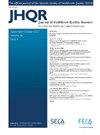Understanding quality and efficiency of cancer care services from oncologist's perspective
IF 1
Q4 HEALTH CARE SCIENCES & SERVICES
引用次数: 0
Abstract
Objectives
Enhancing the quality of critical care services requires a comprehending of the elements that contribute to their efficiency. This study proposes a new way of understanding of cancer service quality and efficiency from oncology professionals’ perspective by combining crisp and stochastic DEA techniques blended with a fully ranking DEA–AHP approach.
Methods
Our analysis is based on the analysis of cancer care services efficiency of 81 provinces of Turkey by using indicators of cancer care process, quality of cancer care, general quality of health and cancer care services, development level of provinces, and cancer mortality. Based on the DEA–AHP integrated model with fuzzy AHP weights, provinces located in poor areas are the least efficient in terms of cancer care services. Harmonized crisp and stochastic province-level efficiency analysis serves as a mediator variable to better understand the efficiency of cancer services by using geospatial data in oncology and allows capturing the efficiency dynamics of cancer care.
Results
The study findings highlight that the least efficient provinces for cancer care services are those that are mainly found in underdeveloped areas.
Conclusion
Cancer policy makers and oncology professionals should consider the efficiency dynamics of cancer care which acts as a mediator variable to help better understand the efficiency of cancer services through the use of spatial differences in oncology.
从肿瘤学家的角度理解癌症护理服务的质量和效率
目的提高重症监护服务的质量,需要了解有助于提高其效率的要素。本研究将清晰随机的DEA技术与全排序DEA - ahp方法相结合,从肿瘤学专业人员的角度出发,提出了一种理解癌症服务质量和效率的新方法。方法采用癌症护理流程、癌症护理质量、卫生与癌症护理服务总体质量、各省发展水平、癌症死亡率等指标,对土耳其81个省的癌症护理服务效率进行分析。基于模糊层次分析法权重的DEA-AHP综合模型,贫困地区省份的癌症护理服务效率最低。统一的清晰和随机的省级效率分析作为中介变量,通过使用肿瘤学中的地理空间数据更好地了解癌症服务的效率,并允许捕获癌症护理的效率动态。结果研究发现,癌症护理服务效率最低的省份主要分布在欠发达地区。结论肿瘤政策制定者和肿瘤专业人员应考虑肿瘤护理效率动态作为中介变量,利用肿瘤空间差异更好地理解肿瘤服务效率。
本文章由计算机程序翻译,如有差异,请以英文原文为准。
求助全文
约1分钟内获得全文
求助全文
来源期刊

Journal of Healthcare Quality Research
Medicine-Health Policy
CiteScore
1.70
自引率
8.30%
发文量
83
审稿时长
57 days
期刊介绍:
Revista de Calidad Asistencial (Quality Healthcare) (RCA) is the official Journal of the Spanish Society of Quality Healthcare (Sociedad Española de Calidad Asistencial) (SECA) and is a tool for the dissemination of knowledge and reflection for the quality management of health services in Primary Care, as well as in Hospitals. It publishes articles associated with any aspect of research in the field of public health and health administration, including health education, epidemiology, medical statistics, health information, health economics, quality management, and health policies. The Journal publishes 6 issues, exclusively in electronic format. The Journal publishes, in Spanish, Original works, Special and Review Articles, as well as other sections. Articles are subjected to a rigorous, double blind, review process (peer review)
 求助内容:
求助内容: 应助结果提醒方式:
应助结果提醒方式:


